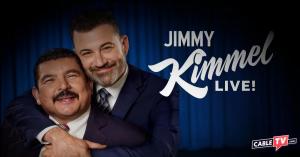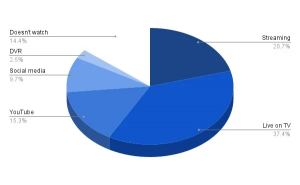CableTV.com Survey Reveals Generational Shift Away from Traditional Late-Night Television

CableTV.com Logo
CableTV.com survey reveals late-night TV viewership is fading as audiences turn to Jimmy Kimmel clips, Stephen Colbert highlights, and streaming comedy.
The late-night format isn’t dying—it’s evolving. Its future won’t look like Carson’s or even Kimmel’s. It will look like whatever people are sharing on their phones at midnight.”
DRAPER, UT, UNITED STATES, October 6, 2025 /EINPresswire.com/ -- CableTV.com today announced the results of a comprehensive nationwide late-night survey examining how Americans watch late-night television in 2025. The findings reveal a dramatic shift away from traditional network broadcasts as audiences increasingly turn to streaming platforms, podcasts, and social media for nightly entertainment.— Olivia Bono
For decades, late-night television has been one of America’s most enduring cultural touchpoints—a place where politics, pop culture, and humor met after the evening news. According to the new CableTV.com late-night survey, that era is changing fast. The genre’s long reign as the cornerstone of American entertainment is giving way to a fragmented, digital-first audience that consumes comedy on demand.
The late-night survey, conducted between September 1 and September 15, 2025, polled more than 1,200 U.S. adults across all regions and age groups. It sought to understand how streaming and social platforms are reshaping the nightly viewing ritual once defined by hosts such as Johnny Carson, David Letterman, Jay Leno, and Conan O’Brien.
Among the key findings:
• Nearly 70 percent of Gen Z respondents said they “rarely or never” watch a late-night show live, preferring short clips on YouTube, TikTok, or Instagram.
• Fifty-four percent of Baby Boomers still watch at least one late-night show weekly, compared to just 22 percent of Millennials and Gen Z.
• Fifty-eight percent now turn to streaming services such as Netflix and Prime Video for comedy rather than broadcast TV.
• Forty-one percent reported spending more time listening to podcasts than watching late-night programs.
• Over half of respondents could name no more than two current late-night hosts, compared to the 1990s when most could list at least five.
“Late-night television was once the heartbeat of American pop culture,” said Craig Stirland, spokesperson for CableTV.com. “Our research shows that while the legacy of Johnny Carson and David Letterman remains strong, the way audiences engage with comedy has shifted permanently to on-demand and social platforms.”
The study found that the traditional 11:30 p.m. timeslot has largely lost meaning. Viewers expect instant access to content instead of tuning in at a set hour. In practice, “late night” now describes what people choose to watch after hours—whether that’s a Netflix special, a viral TikTok sketch, or a live gaming stream.
Younger audiences in particular report feeling disconnected from network programming. Many describe late-night shows as formulaic, overly political, or too polished. “Younger viewers crave authenticity,” said a CableTV.com research analyst. “They want the humor to feel spontaneous and participatory. Traditional talk shows, with their scripted beats and studio audiences, don’t deliver that anymore.”
Still, the survey points to opportunity for evolution. Jimmy Kimmel Live! and The Late Show with Stephen Colbert remain the strongest brands in the space, largely because both hosts have embraced online distribution. Segments such as Kimmel’s “Mean Tweets” and Colbert’s nightly political commentary often reach millions more views on YouTube than during the original broadcast.
“Hosts like Kimmel and Colbert are adapting in real time,” added a CableTV.com editor. “They’re not just TV hosts—they’re multi-platform storytellers whose reach now extends far beyond television.”
CableTV.com’s historical analysis situates these findings within six decades of late-night evolution. Johnny Carson’s charm defined stability; Letterman’s irony captured post-Watergate skepticism; Jay Leno’s conversational style epitomized mainstream appeal; and Conan O’Brien’s absurdism anticipated internet humor. Today’s late-night era—driven by Kimmel, Colbert, and Fallon—must compete not with rival networks but with the endless scroll of social media.
The report highlights how this democratization of comedy has fractured audiences. Where once millions laughed at the same monologue, humor now spreads through micro-moments: a single meme, clip, or quote reshared across feeds. “Comedy has become more distributed and more disposable,” said another CableTV.com researcher. “The next big laugh might come from a TikTok creator who wasn’t even on the radar yesterday.”
Despite the decline in live viewership, the late-night survey suggests that late-night television still serves an important social role. It provides structure and familiarity—a predictable rhythm amid the chaos of digital media. “Late night isn’t obsolete,” Stirland emphasized. “It’s reinventing itself to stay relevant to how people consume culture today.”
CableTV.com’s data also show that network survival increasingly depends on digital synergy. When clips perform well online, overall awareness of a show—and its advertising value—rises dramatically. “In some ways, YouTube is the new after-show,” the study concludes. “Viral traction now drives the same cultural impact that Nielsen ratings once did.”
Historically, late-night television served as a launching pad for comedians such as Jerry Seinfeld, Ellen DeGeneres, and Tina Fey. Now, that discovery process happens online. “Instead of earning a spot on the couch next to a network host, comedians build audiences directly through streaming platforms,” noted the CableTV.com editorial team. “The new late-night stage is the social feed.”
The survey also revealed significant emotional divides between age groups. Older respondents described late-night shows as comforting, nostalgic, and trustworthy. Younger participants, meanwhile, viewed them as extensions of corporate media rather than outlets for creative experimentation. That distinction, CableTV.com says, underscores how personalization has replaced communal experience. “In 1993 everyone talked about Letterman’s Top Ten List the next morning,” said a CableTV.com analyst. “Today, ten million people see ten million different things before breakfast.”
CableTV.com’s broader interpretation is that late-night television now mirrors the fragmentation of American life itself. The format survives, but the audience is splintered. The report closes with a challenge to networks: innovate or risk irrelevance. “The future of late-night television will depend on adaptability,” the study concludes. “Those who experiment—by blending broadcast with streaming, interactivity, and community—stand the best chance of keeping the lights on after midnight.”
Readers interested in exploring regional cable and internet options that enable streaming access to comedy and entertainment can use the find providers near you tool available through CableTV.com’s ZIP code search. The site’s resource allows viewers to compare TV and internet packages by entering a ZIP code to discover what services are available in their area.
Full results and extended commentary are published in a feature article available on CableTV.com, which offers additional insights into generational viewing trends and predictions for how streaming will shape the next decade of televised comedy. To learn more about the late-night survey, streaming comparisons, or entertainment insights, visit CableTV.com.
About CableTV.com
CableTV.com helps over 75 million people make better TV and internet decisions by delivering expert research, entertaining insights, and actionable comparisons. Whether you’re exploring the future of streaming or deciding how to binge-watch your favorite shows, CableTV.com connects readers to the fun.
Craig Stirland
CableTV.com
+1 801-708-0318
pr@cabletv.com
Visit us on social media:
LinkedIn
Bluesky
Instagram
Facebook
YouTube
TikTok
X
Legal Disclaimer:
EIN Presswire provides this news content "as is" without warranty of any kind. We do not accept any responsibility or liability for the accuracy, content, images, videos, licenses, completeness, legality, or reliability of the information contained in this article. If you have any complaints or copyright issues related to this article, kindly contact the author above.



